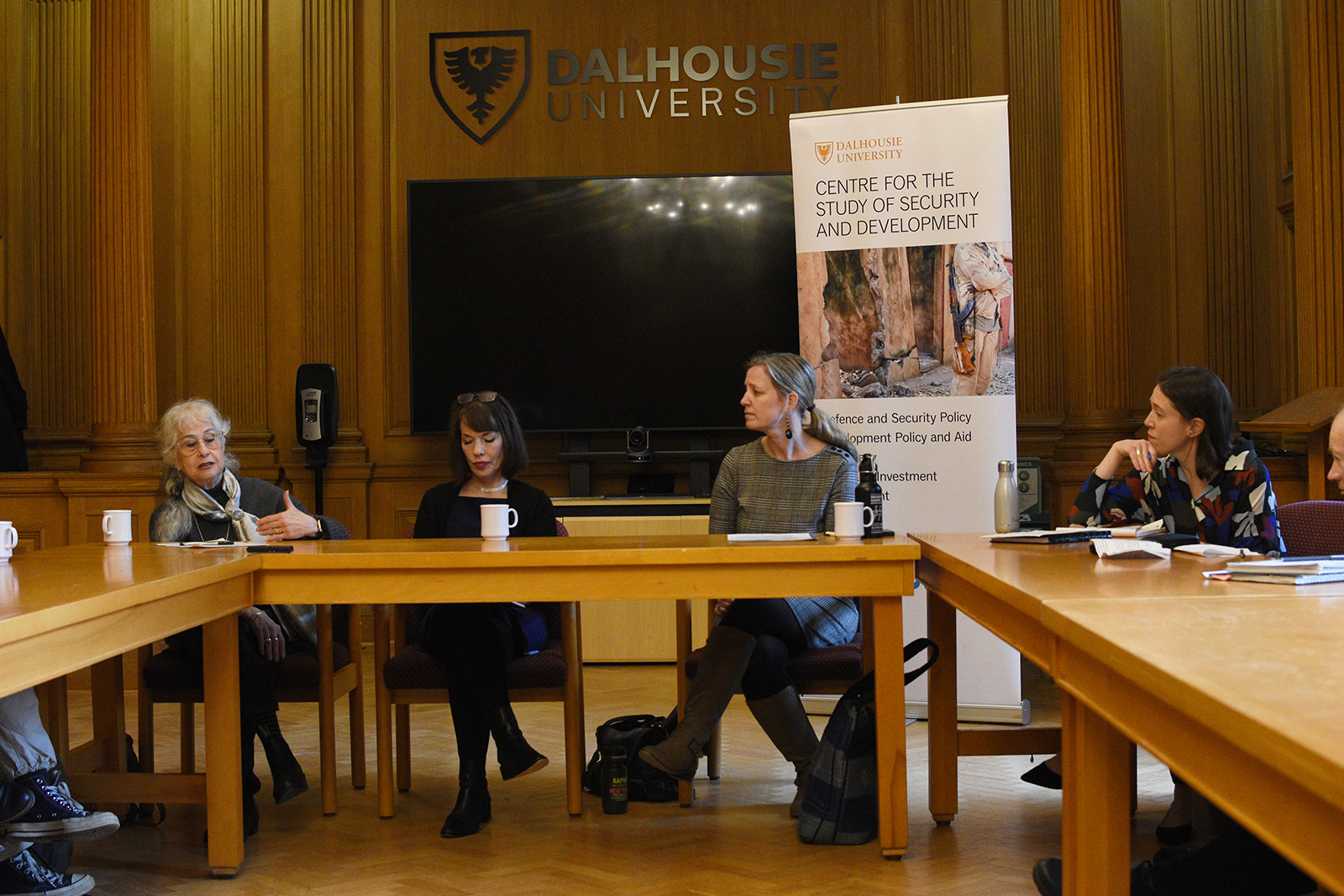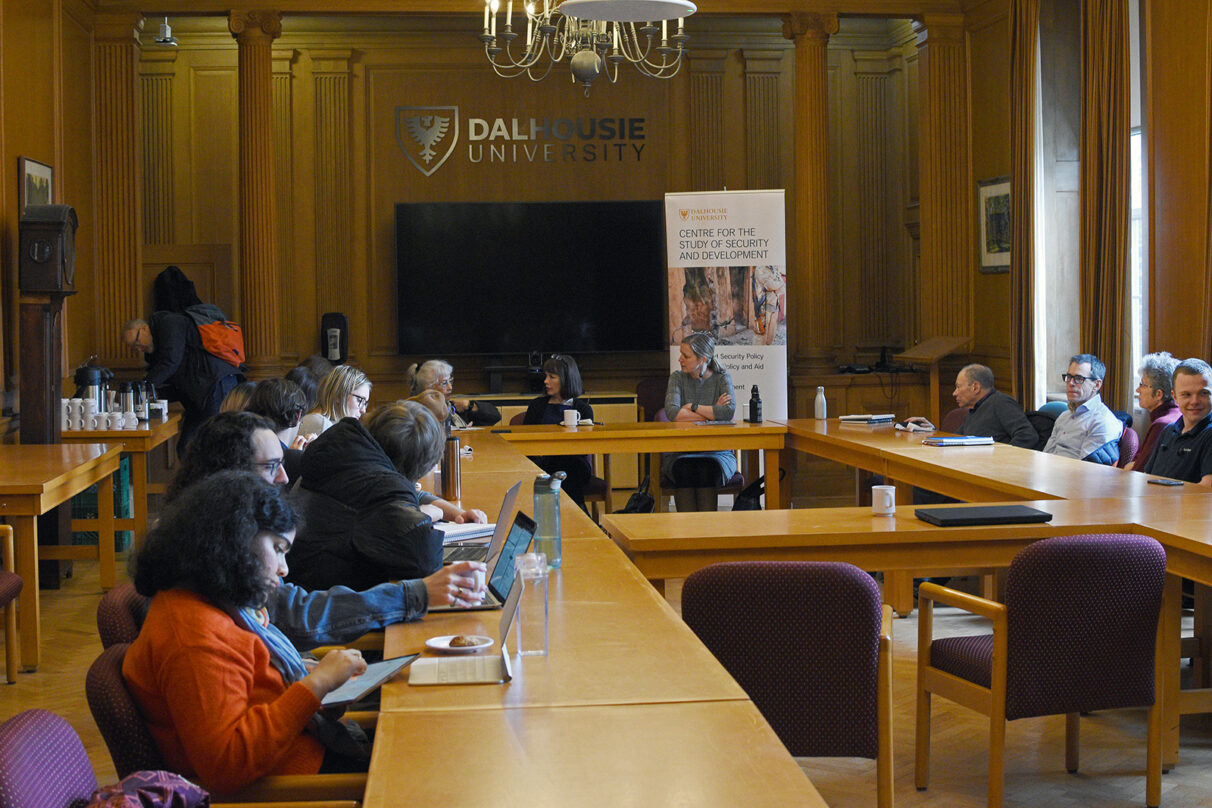Conflict resolution begins with children, panel says
Academics discuss ways to have difficult discussions in times of conflict

caption
(L-R) professor Daphna Levit, Bridgette Brownlow, professor Catherine Bailli Abidi and moderator professor Leah Sarson discuss at the difficult discussions panel discussion in the Henry Hicks building at Dalhousie University, in Halifax, N.S., on Nov. 30, 2023The ongoing conflict in Gaza between Israel and Hamas is difficult to talk about, says Dalhousie academic Leah Sarson.
“Conversations are often fraught,” said Sarson, an assistant professor of International relations in Dalhousie University’s department of political science. “Participants often come with certain understandings, certain biases, certain prejudices, that are not conducive to dialogue and discourse,” she said.
It’s a situation that motivated Sarson to host a panel discussing discourse and dialogue in times of conflict.
“I was struggling to think about how I could engage my students in conversations about these issues in a way where they felt comfortable,” she said.
About 16 people attended the event on Nov. 30. The panel was hosted by the Centre for the Study of Security and Development at Dalhousie University. It featured author and professor Daphna Levit, peace and conflict scholar Catherine Bailli Abidi and conflict resolution adviser Bridgette Brownlow. Sarson mediated the discussion, which focused on three broad topics: authority and expertise in the context of discourse, the idea of othering, and empathy and solidarity within global politics.
“At the very base of this is humility,” said panelist Bridgette Brownlow, whose experience includes facilitating peacebuilding initiatives in Northern Ireland. “So, it is very difficult to engage in conflict situation with any type of balance or respect for your outside role, unless you have an understanding of what needs to be handled, and what it means to respect self-determination.”
For Brownlow, who is president of Peaceful Schools International and a conflict resolution adviser at Saint Mary’s University, much of the work in promoting conflict resolution must start with children.
“We need to ensure we’re equipping children with the skills [of] how to have a difficult conversation, how to say your story, how to listen actively, how to respectfully engage with other people, based on their opinion,” she said.
Professor Abidi, a child and youth studies academic and chair at the Allaire Institute for Children, Peace and Security, said the absence of children in conversations of conflict resolution is a problem.
“When we look at policy, children and young people are never invited to that space. They don’t contribute. They’re not heard,” she said. “The language of security, the language violence, is privilege, and is seen as more sophisticated or professional,” she said.
“Boundaries are constantly a challenge”
Levit spoke about her own experiences in the realm of conflict. In reference to the subject of authority, knowledge and critical thinking, she recalled an experience she had while teaching economics classes in Ben Gurion University in Be’er Shiva, Israel.
“I’m kind of short and my class was full of soldiers,” she said, adding that “in Israel, a soldier can never leave his ammunition, so they bring it into the classroom.”
”In comes this little person that tries to teach them something. That authority is very challenging,” she said. “Sometimes to tell a student that he failed on the midterm when he’s holding his gun, those boundaries are constantly a challenge.”
“Most people at 18 haven’t developed [critical thinking]. And yet they’re dragged and recruited into the military and told this is what they have to do. So, they don’t have the capacity to resist, nor the authority or the power, nor maybe the strength to protest what what’s going on,” she said.

caption
People gathered to attend a panel discussion held by the Dalhousie Centre for the Study of Security and Development, in Halifax N.S., on Nov. 30.Attendee Madhuparna Gupta, a political science instructor at Saint Mary’s University, said it was valuable to hear from experts with real-world experience.
“That first-hand information … is not always available to us, especially outsiders. So that [is much more valuable] than browsing books and gathering knowledge from secondary sources,” she said.
Aaron Wright, a history professor at Dalhousie, said he came to learn about how to better teach in a politically tense environment. He said discussions about the war in Gaza are “incredibly polarized.”
“There’s not enough spaces for people to try and have a balanced conversation, even if not everyone in the room agrees.
After the talk, professor Daphne Levit said she thought it was important to speak at these types of events.
“The more that people actually hear about the experiential side of things, the more they can understand the difficulties of conflict resolution. I think I have the experiential rather than the theoretical side of it,” she said. “I’ve lost too many friends to wars. I don’t want this to be the fate of children growing up today. I mean there’s not a single male left of my high schools, cause all of them are dead. And all of them pretty much died in one war or another.”
About the author
Giancarlo Cininni
Giancarlo Cininni is completing his fourth year of the BJH program. He has experience reporting in Brazil and Canada. When he is not staring...
